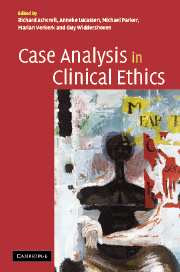Book contents
- Frontmatter
- Contents
- Notes on contributors
- Acknowledgements
- 1 Philosophical introduction: case analysis in clinical ethics
- 2 Families and genetic testing: the case of Jane and Phyllis
- 3 Family access to shared genetic information: an analysis of the narrative
- 4 A virtue-ethics approach
- 5 Interpretation and dialogue in hermeneutic ethics
- 6 ‘Power, corruption and lies’: ethics and power
- 7 Reading the genes
- 8 A utilitarian approach
- 9 A feminist care-ethics approach to genetics
- 10 A conversational approach to the ethics of genetic testing
- 11 Families and genetic testing: the case of Jane and Phyllis from a four-principles perspective
- 12 A phenomenological approach to bioethics
- 13 An empirical approach
- 14 Response to ethical dissections of the case
- 15 Philosophical reflections
- Index
- References
2 - Families and genetic testing: the case of Jane and Phyllis
Published online by Cambridge University Press: 01 September 2009
- Frontmatter
- Contents
- Notes on contributors
- Acknowledgements
- 1 Philosophical introduction: case analysis in clinical ethics
- 2 Families and genetic testing: the case of Jane and Phyllis
- 3 Family access to shared genetic information: an analysis of the narrative
- 4 A virtue-ethics approach
- 5 Interpretation and dialogue in hermeneutic ethics
- 6 ‘Power, corruption and lies’: ethics and power
- 7 Reading the genes
- 8 A utilitarian approach
- 9 A feminist care-ethics approach to genetics
- 10 A conversational approach to the ethics of genetic testing
- 11 Families and genetic testing: the case of Jane and Phyllis from a four-principles perspective
- 12 A phenomenological approach to bioethics
- 13 An empirical approach
- 14 Response to ethical dissections of the case
- 15 Philosophical reflections
- Index
- References
Summary
We share much of our genetic make-up with members of our biological family. This means that genetic information about one person is also sometimes, to a greater or lesser extent, information about that person's relatives. A genetic test can sometimes therefore diagnose or predict disease not only in the individual tested but also in his or her biological relatives.
The familial nature of the information produced by genetic tests raises questions about the legal and ethical obligations of healthcare professionals to disclose or withhold genetic information about patients to their at-risk relatives. Such questions are brought into sharp focus by clinical genetic situations in which different members of the same family are all ‘patients’ of one clinician but each attends the clinic independently with separate issues and agendas that need to be addressed. In such situations each patient is owed a duty of care by that clinician, who may feel pulled in different directions by the differing needs of the family members, and may feel unclear about how to prioritise each. Such questions are particularly difficult when family members are in conflict but they also arise when members have simply lost touch with each other. In such cases, there can be an ethical conflict between preserving the confidentiality of one patient on the one hand and the right of other family members to know information about their genetic status and risk of disease on the other.
- Type
- Chapter
- Information
- Case Analysis in Clinical Ethics , pp. 7 - 26Publisher: Cambridge University PressPrint publication year: 2005
References
- 1
- Cited by



